Millar, Seán  ORCID: https://orcid.org/0000-0003-4453-8446
(2024)
Non-fatal drug-related hospital admissions in Ireland, 2023.
Drugnet Ireland,
Issue 89, Autumn 2024,
pp. 40-45.
ORCID: https://orcid.org/0000-0003-4453-8446
(2024)
Non-fatal drug-related hospital admissions in Ireland, 2023.
Drugnet Ireland,
Issue 89, Autumn 2024,
pp. 40-45.
| Preview | Title | Contact |
|---|---|---|
|
PDF (Drugnet 89)
1MB |
The HIPE (Hospital In-Patient Enquiry) scheme is a computer-based health information system, managed by the Economic and Social Research Institute (ESRI) in association with the Department of Health and the Health Service Executive. It collects demographic, medical, and administrative data on all admissions, discharges, and deaths from acute general hospitals in Ireland. Each HIPE discharge record represents one episode of care; each discharge of a patient, whether from the same or a different hospital, with the same or a different diagnosis, gives rise to a separate HIPE record. The scheme therefore facilitates analysis of hospital activity rather than of the incidence of disease. HIPE does not record information on individuals who attend emergency departments but are not admitted as inpatients. Monitoring of drug-related acute emergencies in the Irish context refers to all admissions for non-fatal overdoses to acute general hospitals in Ireland.
Drug-related emergencies – non-fatal overdoses
Data extracted from the HIPE scheme were analysed to determine trends in non-fatal overdoses in patients discharged from Irish hospitals in 2023.1 There were 4,523 overdose cases in 2023, of which 47 died in hospital. Only discharged cases are included in this analysis (n=4476). There was a noticeable increase in overdose cases during the years of the COVID-19 pandemic, with the number of discharged overdose cases in 2020 being the highest recorded in 12 years. Since the end of the pandemic, overdose cases have decreased, with the number of discharged overdose cases in 2022 being the lowest recorded since 2017 (see Figure 1).
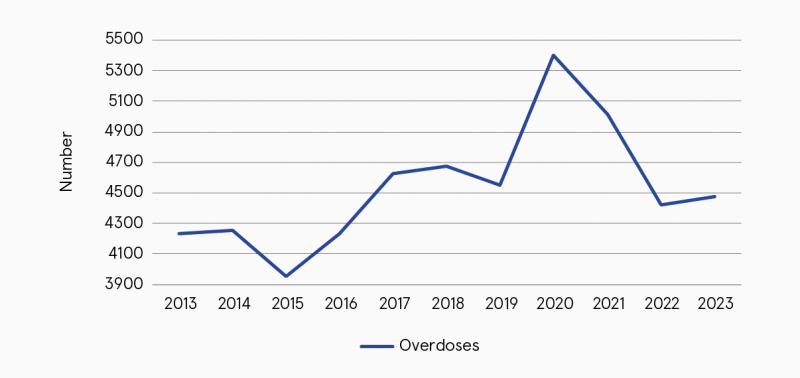
Source: HIPE, Healthcare Pricing Office, 2024
Figure 1: Number of non-fatal overdose cases admitted to Irish hospitals, by year, 2013–2023
Sex of overdose cases
Between 2013 and 2023, there were more overdose cases among women than men, with women accounting for 2,528 (56.5%) of all non-fatal overdose cases in 2023 (see Figure 2).
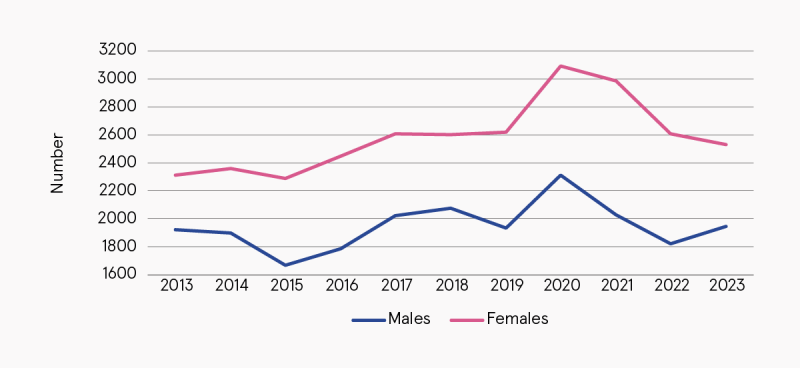
Source: HIPE, Healthcare Pricing Office, 2024
Figure 2: Number of non-fatal overdose cases admitted to Irish hospitals, by year and sex, 2013–2023
Age group
Between 2015 and 2020, there was a general increase in the number of non-fatal overdose cases in all age groups.
As noted in previous years, the incidence of overdose cases in 2023 peaked in the 15-24 years age group (see Figure 3). In 2023, some 34.3% of cases were under 25 years of age.
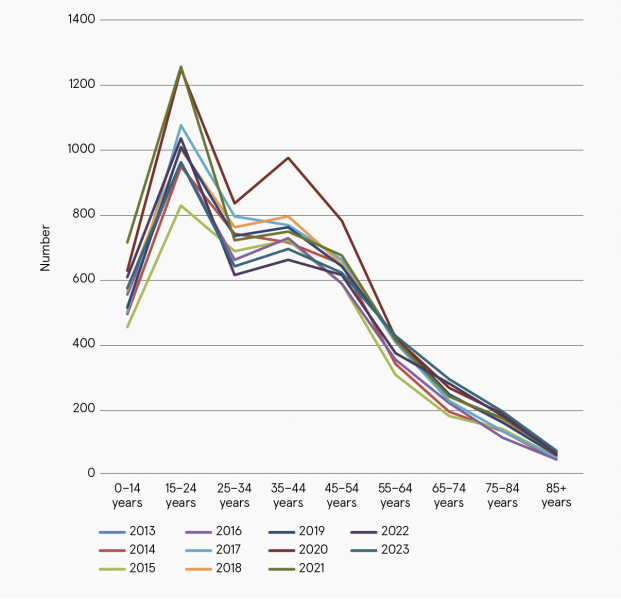
Source: HIPE, Healthcare Pricing Office, 2024
Figure 3: Non-fatal overdose cases admitted to Irish hospitals, by year and age group, 2013–2023
Toxicology of drug-related acute emergencies
Table 1 presents the positive findings per category of drugs and other substances involved in all cases of overdose in 2023. Non-opioid analgesics were present in 1,541 cases. Paracetamol is included in this drug category and was present in 1,323 of cases in 2023.
Benzodiazepines and psychotropic agents were taken in 832 and 1,059 of cases, respectively. There was evidence of alcohol consumption in 260 of cases in 2023. Cases involving alcohol are included in this analysis only when alcohol was used in conjunction with another substance.
Table 1: Categories of drugs involved in non-fatal overdose cases admitted to Irish hospitals, 2023
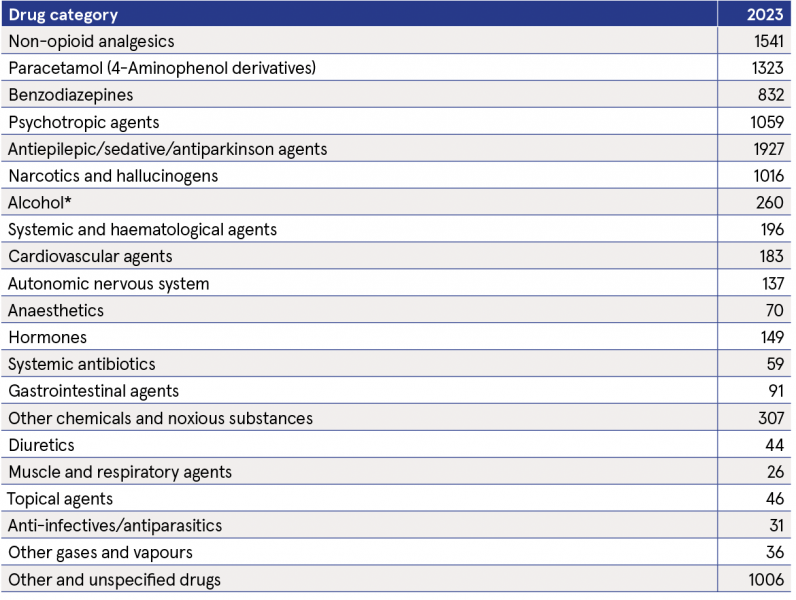
Source: HIPE, Healthcare Pricing Office, 2024
Note: The sum of positive findings is greater than the total number of cases, as some cases involved more than one drug or substance.
* Alcohol was only included for cases where any code from any of the other drug categories in this table was also reported.
Overdoses involving narcotics or hallucinogens
Figure 4 shows positive findings of illicit substances among overdose cases in 2023. Opioids were used in 17.6% (n=786) of cases; cocaine in 5.9% (n=263) of cases; and cannabis in 2.7% (n=120) of cases in 2023. No overdose cases (or five or fewer) involving LSD or other hallucinogens were recorded.
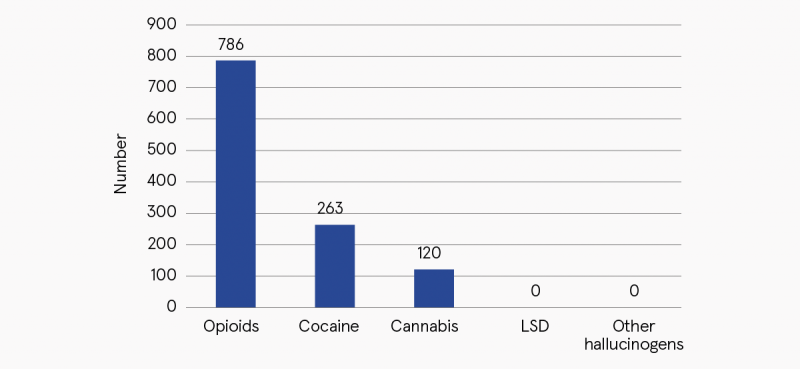
Source: HIPE, Healthcare Pricing Office, 2024
Figure 4: Narcotics and hallucinogens involved in non-fatal overdose cases admitted to Irish hospitals, 2023
Overdoses classified by intent
For 62.1% (n=2779) of cases in 2023, the overdose was classified as intentional (see Figure 5). For 9.6% (n=428) of cases, classification of intent was not clear.
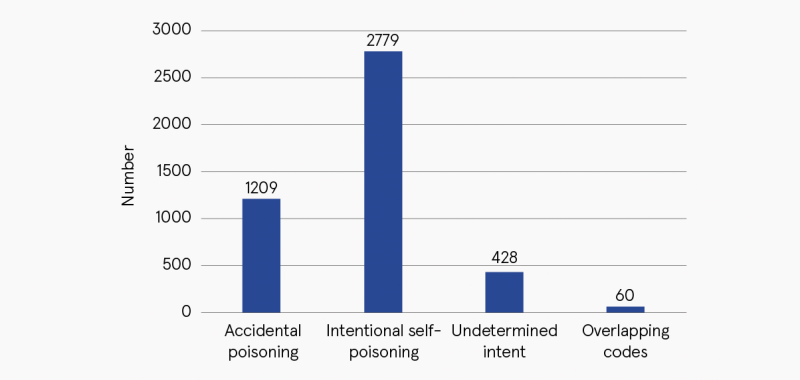
Source: HIPE, Healthcare Pricing Office, 2024
Figure 5: Non-fatal overdose cases admitted to Irish hospitals, classified by intent, 2023
Table 2 presents the positive findings per category of drugs and other substances involved in cases of intentional self-poisoning in 2023 (n=2779).
In 2023, non-opioid analgesics were involved in 1,297 of cases, benzodiazepines in 531, and psychotropic agents in 838 of cases.
Table 2: Categories of drugs involved in intentional self-poisoning cases admitted to Irish hospitals, 2023
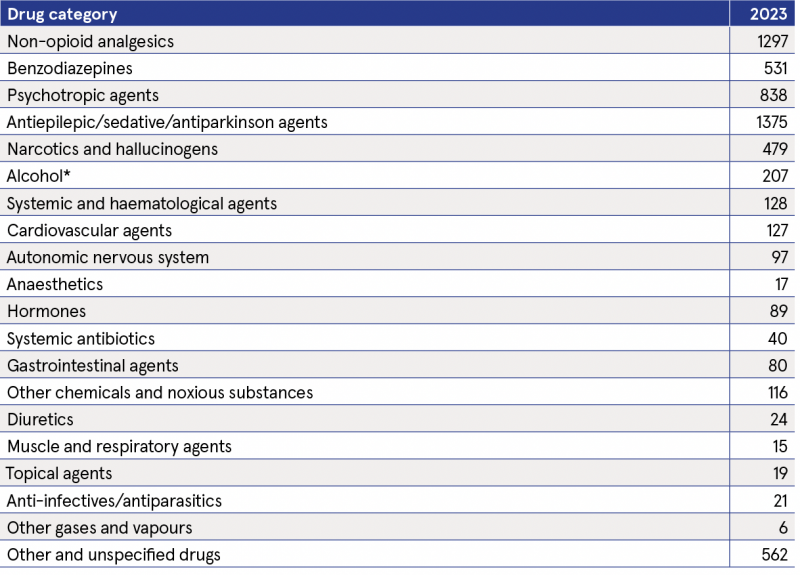
Source: HIPE, Healthcare Pricing Office, 2024
Note: As some discharges may be included in more than one drug category, the total count in this table exceeds the total number of discharges.
* Alcohol was only included for cases where any code from any of the other drug categories in this table was also reported.
1 For further information on HIPE data, visit the Healthcare Pricing Office website: http://www.hpo.ie/
B Substances > Cannabis / Marijuana
B Substances > Substances in general
B Substances > Alcohol
B Substances > Hallucinogens / Psychedelics
B Substances > Cocaine
B Substances > Opioids (opiates)
B Substances > New (novel) psychoactive substances > Benzodiazepines
E Concepts in biomedical areas > Medical substance > Over the counter drug (medicine / medication)
E Concepts in biomedical areas > Medical substance > Prescription drug (medicine / medication)
G Health and disease > Substance use disorder (addiction) > Alcohol use disorder > Alcohol intoxication
G Health and disease > Substance use disorder (addiction) > Drug use disorder > Drug intoxication
G Health and disease > Substance use disorder (addiction) > Drug use disorder > Drug intoxication > Poisoning (overdose)
J Health care, prevention, harm reduction and treatment > Health care delivery
J Health care, prevention, harm reduction and treatment > Health care programme, service or facility > Hospital
VA Geographic area > Europe > Ireland
Repository Staff Only: item control page